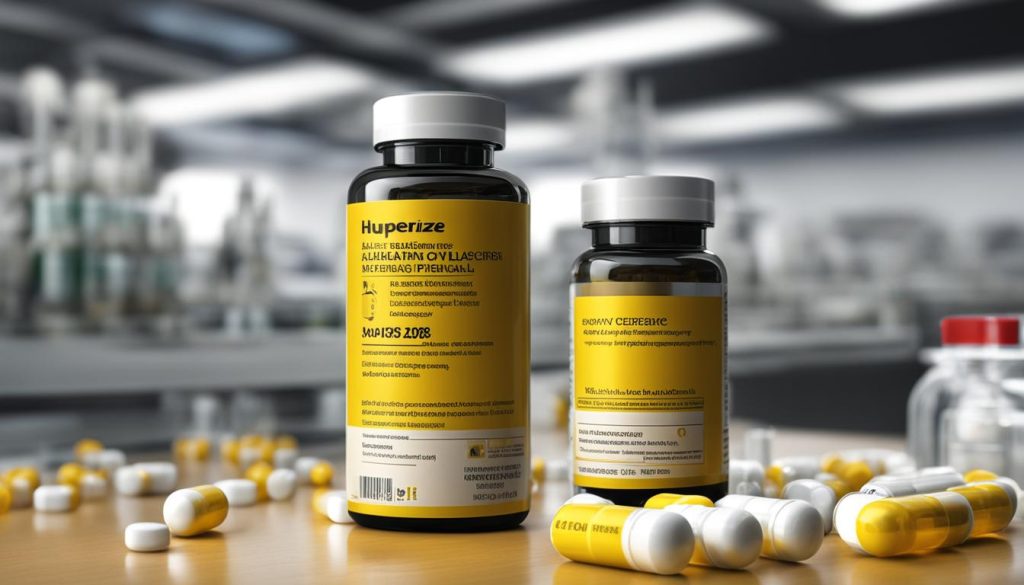Are you looking for a natural way to enhance your brain health and improve your memory? Look no further than huperzine A! This powerful compound, derived from Chinese club moss, has been used for centuries in traditional Chinese medicine. With its potential cognitive enhancement properties, huperzine A has garnered attention as a natural nootropic for brain health. Let’s explore the benefits, dosage, and potential side effects of huperzine A, as well as the top-rated supplements on the market.
Key Takeaways:
- Huperzine A is a natural compound derived from Chinese club moss and has been used in traditional Chinese medicine.
- It has potential cognitive enhancement properties and is often used as a natural nootropic for brain health.
- While huperzine A is not approved by the FDA in the United States, it is approved as a medication in some countries.
- The appropriate dosage of huperzine A is still being studied, and it is important to follow the recommendations of a healthcare professional or the instructions on the supplement label.
- While huperzine A has shown promise in improving cognition in individuals with cognitive impairment or dementia, more research is needed to determine its effectiveness in healthy populations.
Understanding Huperzine A and Its Uses
Huperzine A is a natural acetylcholinesterase inhibitor that increases levels of the neurotransmitter acetylcholine in the brain. This compound has attracted attention for its potential role in the treatment of Alzheimer’s disease. In individuals with Alzheimer’s disease, low levels of acetylcholine are often present. By inhibiting the breakdown of acetylcholine, huperzine A may help to improve memory and cognition.
Huperzine A is also being explored as a potential treatment for vascular dementia. Vascular dementia is a condition caused by reduced blood flow to the brain, leading to cognitive decline. By increasing acetylcholine levels, huperzine A may help to improve memory and cognition in individuals with vascular dementia as well.
While the potential benefits of huperzine A for Alzheimer’s disease and vascular dementia are promising, it is important to note that more research is needed to fully understand its effects and to determine the appropriate dosage and duration of use. Clinical trials and ongoing research will provide further insights into the potential of huperzine A for these conditions.
Potential Benefits of Huperzine A
Studies suggest that huperzine A offers numerous potential benefits for brain function and overall well-being. Research has shown that this natural compound may improve brain function and enhance the ability to perform activities of daily living (ADLs) in individuals with Alzheimer’s disease. Furthermore, huperzine A has shown promise in benefiting those with vascular dementia by improving cognitive function and performance on ADLs.
For individuals with Alzheimer’s disease, huperzine A has been found to enhance brain function and may help in the completion of essential self-care tasks, such as eating and getting dressed. In addition, individuals with vascular dementia may experience improved brain function and overall performance on ADLs, leading to a greater sense of independence and improved quality of life.
However, it’s important to note that further research is still needed to confirm these effects and understand the long-term benefits of huperzine A. Healthcare providers’ assessments and brain function exams are essential to gauge the effectiveness of this compound and tailor treatment plans to individual needs. It is always recommended to consult with a healthcare professional before starting any new supplements or treatment regimens.
Safety Considerations for Huperzine A
Huperzine A is a generally well-tolerated supplement, but it’s important to be aware of its safety considerations. While most individuals experience no side effects, some may encounter mild gastrointestinal discomfort, including nausea, vomiting, and diarrhea. Severe allergic reactions are rare but can occur, necessitating immediate medical attention.
The safety of huperzine A during pregnancy and breastfeeding has not been extensively studied. It is recommended that expectant or nursing mothers exercise caution and consult with a healthcare professional before using this supplement. Additionally, huperzine A is not recommended for use in children or adults over the age of 65 without the guidance of a healthcare professional.
It’s worth noting that individuals with low body weight (under 121 pounds) may be more susceptible to huperzine A’s side effects. If you fall into this category, it’s important to be cautious and consider lower dosages. Overall, it is advisable to consult with a healthcare professional before incorporating huperzine A into your regimen, ensuring your safety and minimizing the risk of any potential side effects or interactions with other medications.

Dosage Recommendations for Huperzine A
When it comes to using huperzine A for its potential cognitive benefits, finding the right dosage is important. However, determining the appropriate dosage can be challenging since research is still ongoing in this area.
In clinical trials, dosages of 0.2-0.8 milligrams per day have been used for Alzheimer’s disease, while dosages of 0.1-0.3 milligrams per day have been used for vascular dementia. These dosages have shown potential benefits in improving brain function and cognition in these specific conditions.
It’s crucial to follow the recommendations of a healthcare professional or the instructions on the supplement label when determining the appropriate huperzine A dosage. They will consider your individual needs and health condition to provide personalized guidance.
It’s important to note that the long-term use of huperzine A is not well-established, and more research is needed to understand its effects over extended periods. Therefore, it is generally recommended to use huperzine A for short-term periods and under the supervision of a healthcare professional.
Always consult with a healthcare professional before starting any new supplement regimen, including huperzine A. They can provide personalized advice based on your specific needs and health condition.
Potential Side Effects of Huperzine A
When considering the use of huperzine A, it’s important to be aware of the potential side effects. Most commonly reported side effects of huperzine A are mild and temporary. These include nausea, vomiting, diarrhea, and blurred vision. These mild side effects usually subside on their own without any intervention.
While severe allergic reactions to huperzine A are rare, they are still possible. If you experience symptoms such as hives, itching, rash, swelling of the face or throat, or difficulty breathing, it could indicate a severe allergic reaction. Seek immediate medical attention if any of these symptoms occur.
Huperzine A may also interact with certain medications, particularly those used to treat Alzheimer’s disease. It’s essential to exercise caution and consult with a healthcare professional if you are taking any other medications along with huperzine A. They can provide guidance on potential interactions and help minimize the risk of adverse effects.
In summary, while most side effects of huperzine A are mild and temporary, severe allergic reactions and medication interactions are possible. If you experience any breathing difficulties, severe allergic reactions, or have concerns about potential interactions with other medications, it’s crucial to seek medical advice. Consulting with a healthcare professional before starting huperzine A can help ensure your safety and well-being.
Ensuring Quality and Safety in Huperzine A Supplements
Dietary supplements, including huperzine A supplement, are not regulated by the FDA in the same way as prescription medications. This means that there is no guarantee of the quality or safety of these supplements. As a consumer, it’s important to be cautious and take steps to ensure that the supplements you are taking are of high quality and safe for consumption.
One way to ensure the quality of huperzine A supplements is to look for third-party testing. Trusted third parties such as U.S. Pharmacopeia (USP), ConsumerLab.com, and NSF provide independent testing and certification. They evaluate the supplements for purity, potency, and accuracy of labeling. Choosing supplements that have been tested by these trusted third parties can provide assurance of quality and safety.
Even when a supplement is third-party tested, it is still important to consult with a healthcare professional before taking it. This is especially crucial if you are taking other medications or have specific health conditions. A healthcare professional can provide personalized advice and guidance on whether huperzine A is suitable for you and if it may interact with any medications you are taking.
Remember, quality and safety should always be a top priority when it comes to dietary supplements. Taking these steps can help ensure that you are getting a high-quality huperzine A supplement that is safe to use.

The Potential of Huperzine A for Cognitive Enhancement
Huperzine A, an intriguing compound, shows promise in enhancing cognitive function and brain health. Studies suggest that it possesses neuroprotective and neurotrophic properties, making it a potential ally for the growth and development of neurons in the brain (neurotrophic). This means that Huperzine A may not only protect the brain but also promote its overall health, which is vital for optimal cognitive performance.
One exciting aspect of Huperzine A is its ability to increase levels of brain-derived neurotrophic factor (BDNF) (neurotrophic). BDNF is a critical molecule that supports learning and memory processes in the brain. By boosting BDNF levels, Huperzine A may enhance cognitive function, helping individuals improve their memory, focus, and overall mental capabilities.
In addition to its neurotrophic effects, Huperzine A may help reduce the harmful effects of excess glutamate in the brain (neuroprotective). Glutamate plays a crucial role in brain function, but excessive levels can lead to neurodegenerative diseases. By modulating the activity of NMDA receptors, Huperzine A may help protect the brain from glutamate-induced damage, potentially supporting long-term brain health.
However, it is essential to note that research on the cognitive enhancement potential of Huperzine A is still underway. While the initial findings are promising, further studies are required to fully understand its effects and potential benefits. As with any supplement, it is crucial to consult with a healthcare professional before starting a Huperzine A regimen to ensure its suitability for individual needs and to maximize its neuroprotective and neurotrophic effects.
Image:
Exploring the Effectiveness of Huperzine A in Healthy Populations
While huperzine A has shown promise in improving cognition in individuals with cognitive impairment or dementia, there is limited research on its effectiveness in healthy populations. As a result, the benefits of huperzine A for individuals without cognitive impairment are not well established.
However, it is important to note that brain health is influenced by multiple factors, including diet, sleep, exercise, and overall lifestyle. Research has consistently shown that maintaining a healthy lifestyle can support optimal brain function and cognitive performance. Therefore, focusing on these lifestyle factors is essential for promoting brain health in healthy individuals.
Research has identified several research-backed supplements that may promote brain health in healthy populations. Probiotics, for example, have been shown to have positive effects on cognitive function by improving gut health, which is linked to brain health. Omega-3 fatty acids, commonly found in fish oil, have also been associated with improved cognitive function and brain health.
Additionally, diet plays a crucial role in brain health. A balanced diet rich in fruits, vegetables, whole grains, lean proteins, and healthy fats provides essential nutrients that support brain function. Including foods that are high in antioxidants, such as berries and leafy greens, can also provide neuroprotective benefits.
Moreover, sleep is vital for brain health and cognitive function. Sufficient and quality sleep allows the brain to recharge and consolidate memories, enhancing cognitive performance. Regular physical exercise has also been linked to improved cognitive function and brain health. Engaging in activities that increase heart rate and challenge the brain, such as aerobic exercises or cognitively stimulating activities like puzzles and learning new skills, can be particularly beneficial.
While huperzine A may offer potential benefits for individuals with cognitive impairment or dementia, more research is needed to determine its effectiveness in healthy populations. In the meantime, focusing on research-backed lifestyle interventions, such as a healthy diet, adequate sleep, regular exercise, and considering other supplements like probiotics and omega-3 fatty acids, can support brain health and cognitive function in healthy individuals.
The Importance of Quality in Nootropic Supplements
Nootropics play a significant role in enhancing cognitive function, including memory and concentration. When considering these supplements, it is crucial to choose products of the highest quality to ensure their effectiveness and minimize the risk of side effects. As with any supplement, not all nootropics are created equal, and some may contain unidentified compounds or make unsupported claims.
One particular nootropic ingredient that requires careful consideration is huperzine A. While it has shown promising results, it is essential to research and read customer feedback before making a purchase decision. By doing so, you can gain valuable insights into the quality and effectiveness of a particular nootropic supplement.
To further ensure the quality of the nootropic supplement, consider seeking products that have undergone third-party testing. Trusted third-party certifications, such as those from U.S. Pharmacopeia (USP), ConsumerLab.com, or NSF, provide assurance of product quality and safety.
By prioritizing quality when selecting a nootropic supplement, you can optimize your cognitive function, memory, and concentration while minimizing the risk of adverse effects.
The Top Nootropics in the Market
When it comes to improving memory, focus, and mental alertness, there are several top-rated nootropics in the market that have gained significant attention. Some of these popular nootropics include Vyvamind, NooCube, Brain Pill, and Brain Actives. Each of these supplements is designed to provide unique benefits and enhance cognitive performance.
Vyvamind is known for its powerful blend of ingredients that support brain health and cognitive function. It aims to enhance memory, focus, and overall mental performance. NooCube, on the other hand, is formulated with a mix of vitamins, amino acids, and other essential nutrients to improve brain function and promote mental clarity.
Brain Pill is another popular nootropic that contains a range of natural ingredients, including huperzine a, to support brain health and enhance cognitive abilities. It focuses on optimizing memory, concentration, and overall cognitive performance. Lastly, Brain Actives incorporates a unique combination of ingredients, such as vitamins, minerals, and natural extracts, to boost brain power, improve focus, and increase energy levels.
When considering which nootropic supplement to choose, it’s essential to research and gather customer feedback. Reading customer reviews can provide valuable insights into the effectiveness and overall experience of using these supplements. Ultimately, selecting the right nootropic supplement depends on individual needs and preferences.
Conclusion
In conclusion, huperzine A is a promising natural nootropic that offers potential benefits for brain health and cognitive function. Research suggests that it can enhance memory, focus, and overall brain performance, especially in individuals with Alzheimer’s disease and vascular dementia.
However, it is important to note that further studies are needed to fully understand the effects of huperzine A and ensure its safety. Before incorporating huperzine A or any other supplement into your routine, it is crucial to consult with a healthcare professional to determine the appropriate dosage and assess any potential interactions with medications you may be taking.
While huperzine A can support cognitive function, it should be viewed as part of a holistic approach to brain health. Adopting a healthy lifestyle that includes a balanced diet, regular exercise, and sufficient sleep is essential for optimizing brain function.
Ultimately, when used responsibly and in conjunction with a healthy lifestyle, huperzine A can be a valuable supplement for individuals looking to enhance their memory, focus, and overall cognitive abilities.
FAQ
What is Huperzine A?
Huperzine A is a chemical found in Chinese club moss and is used in traditional Chinese medicine. It is a natural acetylcholinesterase inhibitor, which increases levels of acetylcholine in the brain.
What are the potential benefits of Huperzine A?
Huperzine A may improve memory and cognition in individuals with Alzheimer’s disease and vascular dementia. It may also improve brain function and performance on activities of daily living (ADLs) in people with these conditions.
What are the safety considerations for Huperzine A?
Huperzine A is generally well-tolerated, but some individuals may experience mild side effects such as nausea, vomiting, and diarrhea. Severe allergic reactions are rare but possible. It is not recommended for use in children or adults over age 65 without the guidance of a healthcare professional.
What is the appropriate dosage of Huperzine A?
The appropriate dosage of Huperzine A is still being studied. In clinical trials, dosages of 0.2-0.8 milligrams per day have been used for Alzheimer’s disease and 0.1-0.3 milligrams per day for vascular dementia. It is important to follow the recommendations of a healthcare professional or the instructions on the supplement label.
What are the potential side effects of Huperzine A?
Most side effects of Huperzine A are mild and temporary, including nausea, vomiting, diarrhea, and blurred vision. Severe allergic reactions are rare but possible and may require immediate medical attention. Huperzine A may also interact with certain medications, so caution should be exercised.
How can I ensure the quality and safety of Huperzine A supplements?
Dietary supplements, including Huperzine A, are not regulated by the FDA in the same way as prescription medications. It is important to choose supplements that have been tested by trusted third parties such as U.S. Pharmacopeia (USP), ConsumerLab.com, or NSF. These certifications can provide assurance of quality and safety.
What is the potential of Huperzine A for cognitive enhancement?
Huperzine A is believed to have neuroprotective and neurotrophic properties, meaning it may protect and promote the growth of neurons in the brain. It may also increase levels of brain-derived neurotrophic factor (BDNF) and reduce the harmful effects of excess glutamate in the brain.
Is Huperzine A effective in healthy populations?
While Huperzine A has shown promise in individuals with cognitive impairment or dementia, there is limited research on its effectiveness in healthy populations. It is important to consider other research-backed supplements and lifestyle factors for brain health.
What should I consider when choosing a nootropic supplement?
It is important to choose high-quality supplements that are effective and free of side effects. Researching customer reviews and considering trusted brands can help in making an informed decision.
What are some of the top-rated nootropic supplements in the market?
Some top-rated nootropic supplements in the market include Vyvamind, NooCube, Brain Pill, and Brain Actives. These products have their own unique blend of ingredients and varying customer feedback.




